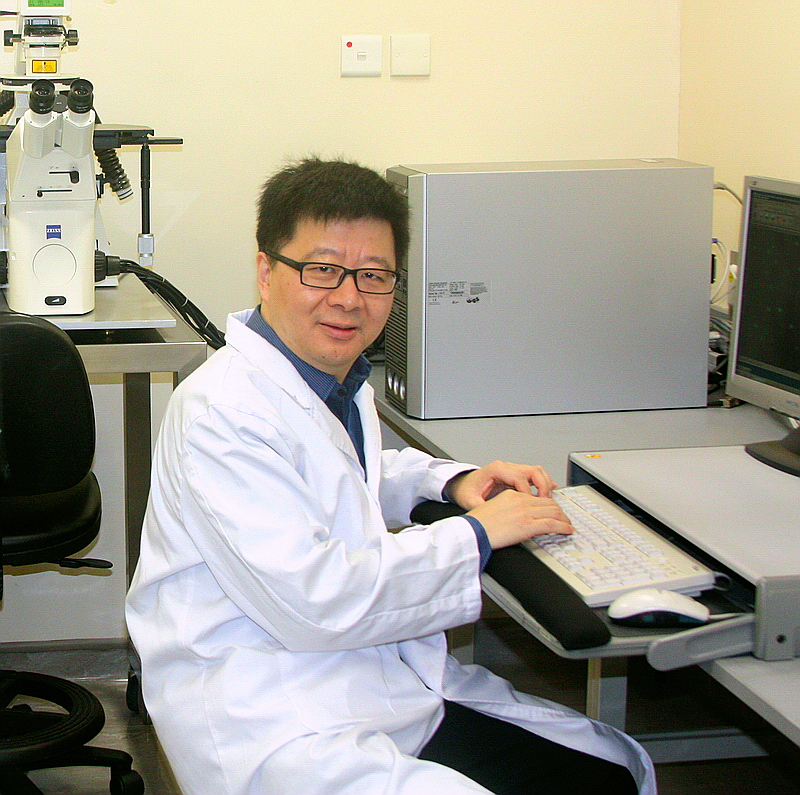A collaborative anti-cancer research jointly conducted by The Hong Kong Polytechnic University (PolyU), Peking University Shenzhen Graduate School and Nevada Cancer Institute has led to the development of a novel class of chemical inhibitors that specifically target cancer cells with pluripotency. This important finding was reported by the journal Cancer Research and highlighted by Nature (China) in January 2012.
This cutting-edge research has combined the effort of three research teams including one led by Dr Tao Ye (葉濤), Associate Professor of PolyU’s Department of Applied Biology and Chemical Technology. This breakthrough may help the selective removal of cancer stem cells and potentially provide a novel strategy to eradicate cancers.
Cancer is a major cause of human death in China and all around the world. It is difficult to treat cause of the existence of cancer initiating cells/cancer stem cells. Although they exist in very few in numbers, cancer stem cells (CSCs) can proliferate and self-renew, and are pluripotent and multipotent, which have the capability to differentiate into various more heterogeneous cancer cells that constitute the entire tumor mass. As stem cells, they are more resistant to most conventional cancer therapies such as chemotherapy or radiotherapy due to their differences in the cell cycle regulation and DNA repair processes. They also act as the source for metastasis and recurring drug resistant cancers after conventional cancer therapy. Currently, there are no chemical inhibitors or other agents that can specifically and selectively target cancer stem cells. The development of compounds that target cancer stem cells is an unmet medical demand for the eradication of malignant cancers.
According to Dr Ye, the potential clinical applications of new LSD1 inhibitors include the following: (1) They can be used to treat malignant germ cell tumors such as teratoma/teratocarcinomas, embryonic carcinomas, seminomas, choriocarcinomas, and tumors of yolk sac. These tumors are usually treated by surgery or cis-platinum, but after initial treatment, these tumors always become resistant to platinum drugs. So far, the LSD1 inhibitors are highly effective towards these pluriptont cancers with stem cell properties. (2) The LSD1 inhibitors may also be used to remove teratomas/embryonic carcinomas during stem cell-based therapy. One major problem in stem/iPS cell-based therapy is the formation of embryonic carcinomas, teratomas, or teratocarcinomas by incomplete differentiation of ES/iPS cells in the organs of recipients. Because LSD1 selectively inhibit these pluripotent embryonic carcinomas, teratomas, or teratocarcinomas, LSD1 inhibitors may help ensure the successful application of stem cell-based therapy. (3) More importantly, since teratomas/embryonic carcinomas are pluripotent cancer stem cells, researchers will probe whether cancer stem cells of other types of major organ-specific cancers such as breast, ovarian, lung, and brain cancers are sensitive to these LSD1 inhibitors. Further studies indicated that LSD1 inhibitors can also be used to inhibit many cancer stem cell-like cells such as breast and ovarian cancers.
A leading scientist in the field of chemical biology, Dr Tao Ye has obtained large amounts of funding from the Research Grants Council to carry out basic research. Since 2010, his research activities have culminated in the publication of 12 original research papers in top research journals with an impact factor greater than five.
Dr Tao Ye’s anti-cancer drug discovery programme was also supported by the generous donation of Fong Shu Fook Tong Foundation and Joyce M. Kuok Foundation.
The write-up on this breakthrough in Nature (China) can be viewed at URL: (http://www.nature.com/nchina/2012/120104/full/nchina.2012.1.html)
*****
